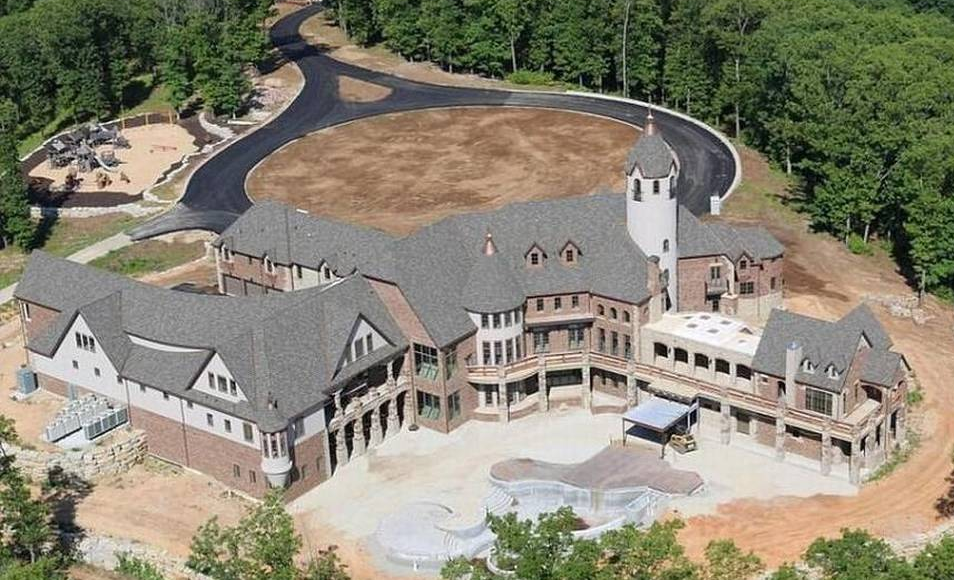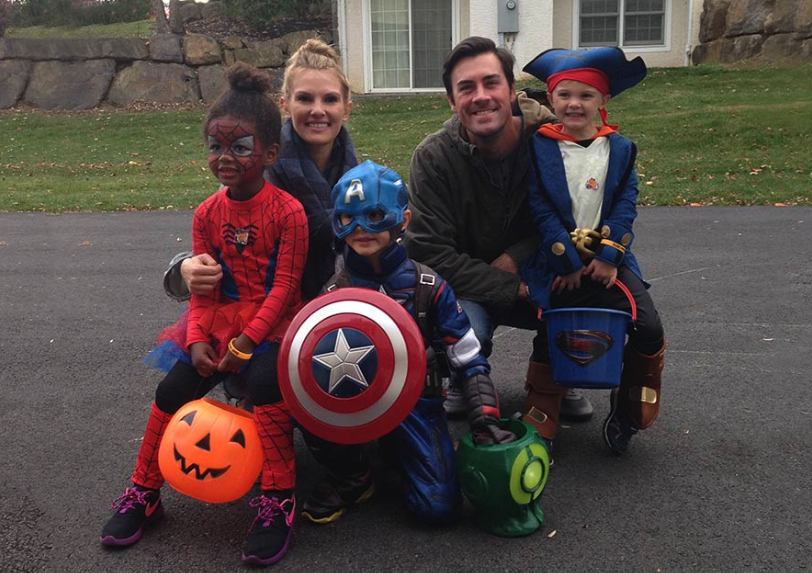
Just this past December (you remember it), a $10,000,000 home (the one you see above) was donated to a Christian camp in Missouri for kids with disabilities.
Not a $10,000 dollar check.
Not an old car that was actually “donated” for the tax write-off.
A TEN MILLION DOLLAR MANSION.
I mean, look at that thing.
It’s 31 THOUSAND square feet. Over 100 acres of property, with 1700 feet of shoreline. TEN bedrooms. Thirteen FULL bathrooms. Four separate living areas. Full-sized playground.
Who would do this?
Surely some trust funder who grew up with more money than he knew what to do with and is just looking for a way to soothe his conscience.
A Rockefeller or Getty or somesuch, right?
Uh, nope.
Get this: this $10MM mansion was donated by… a pro athlete.
A what?!
A professional athlete?!
Those guys are the worst!
They get paid millions and millions of dollars and play fun sports for a living, with grimaces on their faces and terrible attitudes!
They shoot those phony, “We help the community! Aren’t we amazing!?” ads that run during televised playoff games–just for the PR.
Sorry but pro athletes are NOT known for their generosity.
Well, here’s the guy who’s bucking that trend: Cole Hamels.

Texas Rangers starting pitcher Cole Hamels looks for a sign as he prepares to throw a pitch against the Seattle Mariners in the first inning of a baseball game Friday, Aug. 7, 2015, in Seattle. (AP Photo/Elaine Thompson)
Cole is, in case you didn’t know, a Big League Pitcher. As in, “Won four postseason games in one season, then won the World Series MVP” Big League. I mean, “A four-time All-Star with five pitches who struck out 211 batters in a season and has thrown a no-hitter” Big League. (Just last year he edged in front of one of my childhood heroes, “The Underwear Man” Jim Palmer on the career strikeouts list. Hike up your britches… and remember Jim.) I could go on with Cole’s accolades, but that’s not all there is to the guy: he’s also a Christ-follower and family leader… and his thoughts (and actions) on money are radically counter-cultural. I was very fortunate to have the chance to talk with him. As you might guess, I had a lot of questions about how someone like this ends up doing something like that.
STEVE: Okay Cole, here’s one off the wall thing I know about you: you’re a smarty. I saw your SAT scores somewhere at some point. You got a 1510??!
COLE: Well… yeah… that was a long time ago…
STEVE: Well I find it fascinating, what can I say? You think better than the rest of us! Now, what you and I have in COMMON isn’t the smarts, it’s that we’re both believers, trying to follow God and lead our families. And you’ve made a lot of unorthodox decisions about money. I think we can learn a lot from you. Now, you came straight from high school into pro baseball, and if I can get a little personal – did you come from a family with wealth?
COLE: No. I mean, my dad did well enough so my mom could stay at home with us. I think that was a big focus for my dad, because he didn’t grow up with a mother. So something he really made a priority was for my mom to be there for us full time, to take care of me and my siblings and raise us through his working career. He did well enough so we could do that.
STEVE: Whoa, so your dad was actually thinking long-term family before you ever came along, and then financial prosperity really bloomed for you through your career. That’s significant. And your parents raised you with faith as a key component of your home?
COLE: Oh yeah; we went to church every Sunday, my parents were volunteers, we did confirmation classes and church camp and all that stuff. It was part of the culture of our home. That was always part of my upbringing.
STEVE: Okay, I’m tracking–that sounds like my family. So tell me what it’s like when you’re 18 years old and you sign a pro contract with a big signing bonus and now massive cash starts dumping into your world. Had any family or friends started grooming you for the kind of financial decisions you were about to be making?
COLE: Actually yes; my father’s degree was in finance, so that played a huge role in my knowing what to do…
STEVE: Dad to the rescue again! I’m liking your dad a lot at this point.
A father can teach his children about money–no matter how much of it he has.
COLE: He was wonderful, still is. Unfortunately, though, we were put into a really bad situation: the adviser that we used (it was a family connection) ended up putting all of our money into a Ponzi scheme… and we actually lost pretty much my whole bonus…
STEVE: [wretching violently] UUUUUUGGGGGGHHHHHHHH
COLE: Yes. I’d always thought, “Oh yeah! You’re 18 and you get paid millions of dollars! Whee!” …I did get a big signing bonus, but by the time I was out of the minors and into the majors I was back down to almost zero. And then we tried to chase down that money, which cost tons of money in itself, and of course you never get that back… So I learned quite early that it can be gone really quick. I had to start over, effectively, and… you’ve got to be wise with any money that comes your way!
STEVE: Amen to that! (That’s why this website exists, brah.) …Okay so you’re putting some painful financial lessons together, even at that age, your dad is helping you plan and… you started a charitable foundation a few years into your career. Tell us about that decision. Why the heck would you start a foundation for GIVING MONEY AWAY??! Don’t you want to just keep all your money for yourself, to roll around in and live it up like the big dog you are? Isn’t that the American dream? What is the value of giving??
COLE: That might be “the American dream” but it’s not my dream… my wife and I understand that, in order to be part of a community, and certainly to be a leader, you have to be a giver. I know it’s a cliché but you do have to put your money where your mouth is! That’s what we’re trying to do. People can talk about all kinds of great ideas and say they know the best way to live, but if they don’t really get down and dirty and they don’t stand behind what they say with action and, yes, money, then nothing gets accomplished–not really. Before we had the Foundation, we would look for ways to give back to our community and be leaders that way, and we started to feel that we weren’t giving all we were able to give. So we started The Hamels Foundation. We want to do work that’s going to last a lifetime, affecting at least a couple of generations! We also wanted to “leave a legacy”, and by that I just mean being an example for the long haul, so that others might be inspired to do the same for others.

STEVE: Okay so now you’ve got a whole sector of your finances devoted to giving. What do you do with that? How do you decide how you’ll deploy those resources?
COLE: Well we spent a lot of time thinking about what would be the best causes. Yes, we go to church, and we tithe there… That’s important, but something that really stuck with us was the idea that we wouldn’t be where we are if it wasn’t for people providing education to us. If we weren’t given educational resources so that we could make the best possible decisions… where would we be? My father worked for the school district, my wife was an educator, so it seemed kind of part of our family story that we’d go down that route. And I have to say while we’re on the topic, THE person that has really pushed in and educated me and really promoted all that we do… would be my wife!
STEVE: Aw, a good wife is a gift from God. You’ve found a good one?
COLE: 100 percent, without a doubt, she is the wheel that keeps turning with the Foundation and, really, getting us where we need to be as givers. She has great ideas and is always pushing forward, making sure everything is going the right way. She’s just so on top of it. If it wasn’t for her we wouldn’t have come this far, no way.
STEVE: Rad. You’ve got a helper for life! And you have a board of directors for the Foundation, right?
COLE: Yes! I’m very excited about our board. In what I do for a living, it’s just hard to trust people. As I found out myself, there are plenty of dishonest people out there. But as we’ve moved from Missouri, where we first lived, to Philadephia, and now to Texas…
You need a team of advisors around you to keep your head about you.
(And a discerning wife is the best board member you’ll ever have.)
STEVE: Ow! Ranger fever! You are wanted in Texas, my home state! Live long and buy steer!
COLE: Oh yeah! Well as I was saying, in each of these places we’ve lived, it takes a long time but we’ve developed communities of faith in each of them. So now on our board we have several people from the Pennsylvania area, several people from the Missouri area, and we’re starting to get people from Texas. It does take faith but you gotta believe that God will give you signs if you just keep your eyes and ears open. We stay up late into the night, many times, talking and seeking direction and just considering what’s next and who we’ll partner with. And having those people on our side is a great value… if you’ll listen. There will always be somebody on your side if you’ll just listen. If you believe in His power, He’ll answer! We’re just doing the good work we’re called to, but it’s exciting and, as we were saying earlier, that’s what we want to show our kids too.
STEVE: You’re giving the faith of your father to your kids! Which is rock and roll. In addition to your board members, you have other volunteers right?
COLE: It’s been really nice to see that so many great people are joining us in the work. Our Foundation is actually taking a huge group of influencers to Africa in April and we have the privilege of showing them what their donations have accomplished in villages of people who just have nothing. Going to that sort of place is always a great eye opener to the opportunities we have in the United States, we’ve been so fortunate. Life is fragile, and we get to decide every day how we want to live it and who we want to be to our neighbors and our family and our community.

STEVE: Okay so now we come to the major piece of overlap between us: Camp Barnabas, which is a Christian camp for kids with special needs. I was on their first-ever staff and uh, you know, WROTE THE CAMP THEME SONG, which is kind of a big deal…
COLE: Hey! Fun!
STEVE: I had a blast there and continue to have a very special place in my heart for Camp Barnabas… how did you find it?
COLE: My wife grew up in the Springfield/Branson area so she just knew it as a local camp. When we met we were in that area a lot, and as you know it’s beautiful… and we just love it. We were there in the off-seasons and whenever we could. And Camp Barnabas is a lot of things: it’s providing families with help for their hard situations, some relief and fun for those kids, and it’s education, too. Not only education regarding the Christian faith but in making volunteers and staffers educated about special needs. And talk about sustainable… it’s been around a while now! It’s not an idea that just came up and might not be there tomorrow. That matters when you’re looking for a place to invest heavily.
STEVE: And those factors led you to the MASSIVE, EYE-POPPING gift that you gave them. What’s that story?
COLE: Well when we were traveling to Missouri a lot, we bought a piece of land and started building a big house; we’d imagined how the Foundation–which we were just starting–might use that place. We could throw phenomenal fundraisers there, you know, we could maybe do a kind of camp there, build some guesthouses, maybe a dorm-type situation… So we were kind of going down that road and the place was coming along… But then we had to direct our future toward the Dallas area: Members of my extended family started moving there because of jobs, then my job took me there, and it just became harder and harder to envision the lake house in Missouri being what we’d imagined… FOR US. But it COULD be that for Barnabas. As we talked with them, we heard about how much they’re growing, what their needs are for land in that very area… my wife and I just thought, “Wouldn’t our house be a tremendous blessing if we donated it to that camp?” I mean, it’s one of the biggest pieces of land left on that lake, and when you think of what it could offer the campers, as well as the camp for fundraising events or whatever… The more we talked with them, our hearts were telling us this is the right thing. It’s going to provide an amazing environment for some amazing kids through the amazing work of that camp.
STEVE: I’ll say! Are you kidding?! How much was the land and home valued at when you gave it?
COLE: 10.8 Million.
STEVE: [faints, recovers and tries to throw water on his face, missing, then steps into a potted plant as he regains his feet] What.
COLE: It’s exciting, right? They envision moving the camp, setting up dorms, creating nice new offices in there, throwing events to raise awareness with donors and sponsors… it’s close to Texas, Arkansas, Tennessee, and all the entertainment of Branson is just a boat ride away… It’s going to really raise the profile of the camp.
Look for ways your money can expand the Kingdom wherever you are.
STEVE: Yeah I can see all that, easy. But TEN MILLION BUCKS! It’s just outrageous, no matter how much money you have. I just… let me say it this way: Look, Cole, like the rest of the planet, I’m impressed with your athletic career. It’s great that you’re an ace pitcher and a World Series MVP–all that. Seriously, it’s great. BUT… Jesus said it’s easier for a camel to go through the eye of a needle than for a rich man to enter the Kingdom. And when I meet someone like you I just want to take my shoes off–it’s holy, your generosity–and it’s wise. A man who handles money well, doesn’t lose his head, takes spiritual responsibility for his wealth, voluntarily makes himself accountable, somebody who says, “Look: my integrity, my walk before God. and my family could be shipwrecked by chasing after wealth and it’s not what I’m going to be about…” You’re just a rare commodity. If you’ll allow me to talk this way, I’m proud of you. Well done.
COLE: Gosh, thanks. I’m just trying to handle what I’ve been given.

STEVE: Well from where I sit you’re doing great… I want to ask another kind of personal question: You’re basically living the financial fantasy of most people. We’re interested in luxury and how it’s handled for a Christ-follower. We don’t think it’s off limits but it can be dangerous. For somebody who has as much as you do–you’ll never be able to have a lifestyle that outstrips your earnings. So when it comes to luxury, is your attitude, “YES YES YES MOST EXPENSIVE LET THE GOOD TIMES ROLL BRING ON THE OPULENCE ALL THE TIME FIRST CLASS ALL THE WAY GO FOR IT BABY”?
COLE: You know I actually stay up at night thinking about that very question because… I mean… it’s uncomfortable. I wasn’t raised with this much money. So I wasn’t taught–I couldn’t have been taught–how to use it. I wasn’t taught the huge responsibility that comes with money, so I had to learn… and I learned the hard way. I mean, I’ve taken some phenomenal vacations and I think that’s my idea of what luxury is: to see the world. You have one life and the world is a very big place, and it’s beautiful and I want to explore it. So my wife and I see that as a kind of justifiable luxury. At the same time, we were both raised very conservatively, so we try to be as smart as possible, and to not be flashy or wasteful. And that’s kind of the way that we try to live. Of course there are expectations when we’re in the spotlight, so we play that part when needed… but when we come back home, I mean I’m in jeans and a T-shirt and sandals. I’m a very low-key, easy maintenance type of guy, and that’s something that we want to portray to our kids. But knowing they’ll be wealthy, we’re also trying to portray how to handle this sort of lifestyle. There will be different expectations for them than there were for me. And like you say, it can be very dangerous. And my wife and I have made our fair share of mistakes–we’re not perfect. Still, we’ve been very blessed with the tremendous opportunities to be able to get the Foundation up and running, handle generous donations, and really make a difference for so many of these children. Those are the biggest rewards, at the end of the day, and I understand that. It’s just a… it’s a constant balance. We are intentionally very conservative and we will always be that way. We’re accountable, we’re going to live with integrity, and we’re going to pass that along to our kids.
It’s okay to indulge… but maintain restraint.
STEVE: Wow, what a stud. Big Jesus kudos to you for the narrow way you’re walking, Cole. Tremendous… Well as a Dallas guy that has family in Plano I’m very happy to hear you’re making your home there, and I hope you’ll play Ranger baseball for a good long while.
COLE: Oh I’ve got some years left in me, and even after I’m retired, we’re going to be there. That’s where we’re going to raise our family; we’ve got a great nucleus of friends and family there so we’re ready to ride.
STEVE: Fantastic. If I may, I’m going to sort of turn my face toward the camera here, and ask all our readers to check out this article that lays out why we’re here, and maybe this one that talks about how to handle luxury. Heck, why not go here and look at how running your home is like running a business, too? You’re certainly doing that Cole; I know you’ve heard it from people in Malawi and Arlington and now Missouri, but… thank you.
COLE: Thank you! It’s been great to talk about such an important topic.
Are you interested in reading more stories about guys who are getting the entire picture of what scripture says when it comes to money? Or maybe you want some very practical tips on how to handle your own money? Join our email list here and we’ll send you a monthly update!






